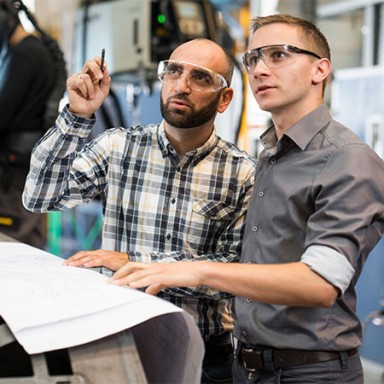Germany
Nadine Matzenmiller
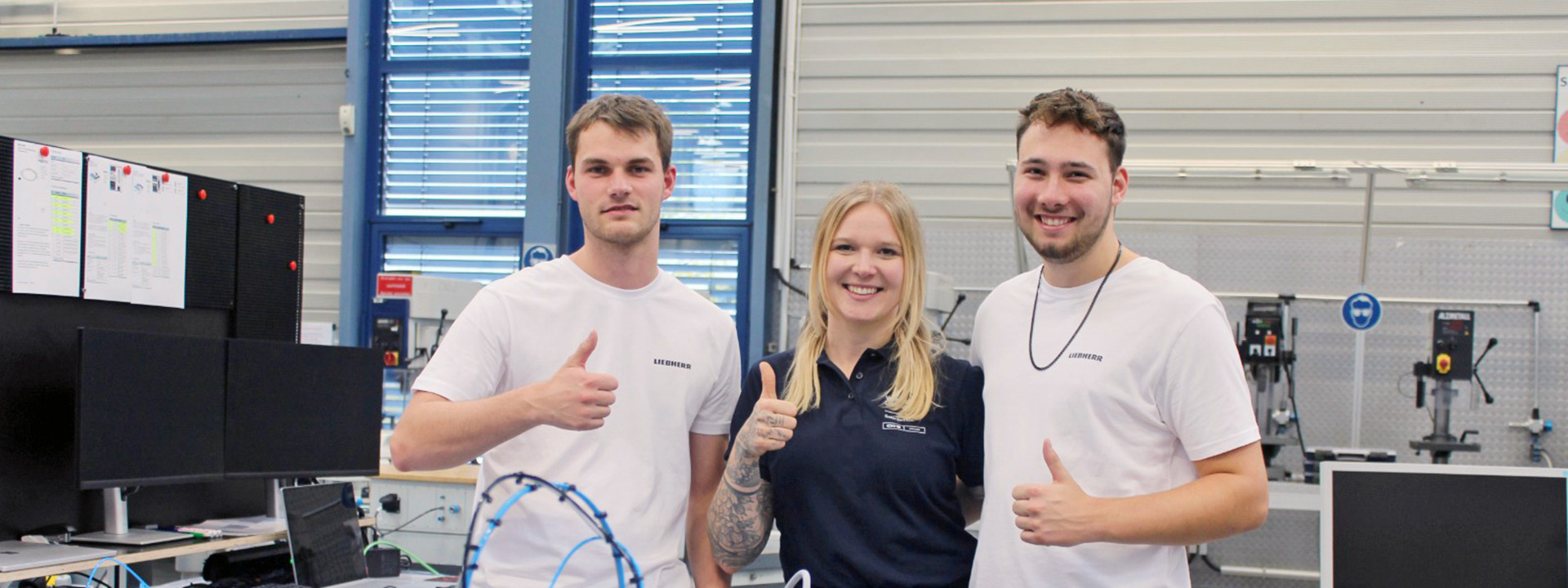
Germany
Nadine Matzenmiller
Germany
Nadine Matzenmiller
Germany
Nadine Matzenmiller
My grandfather used to work at Liebherr in Biberach. So I just applied there for an apprenticeship in mechatronics. Everything just fell into place.
A passion for training
‘What do I want to be?’ Questions like this are at the forefront of many young people’s minds as they approach the end of their school education, considering whether to work with people, with technology or maybe in an office. At 15, Nadine Matzenmiller was no different. The careers advisor told her she should become a helicopter pilot. ‘I felt completely misunderstood because that was not me at all,’ she recalls. One thing she knew for sure: once she received her secondary school-leaving certificate, that would be it. She wanted to get out there and do something practical. ‘My grandfather used to work at Liebherr in Biberach (Germany). So I just applied there for an apprenticeship in mechatronics. Everything just fell into place.’
Today she says this was exactly the right decision. Nadine is now 29 years old and is herself a trainer for mechatronics and electronics technicians at Liebherr’s tower cranes product segment in Biberach. Since early 2024, she has also been a lecturer for industrial foremen at the Academy of the Swabian Chamber of Industry and Commerce, and works as an examiner for the Prüfungsaufgaben- und Lehrmittelentwicklungsstelle (PAL), a German institute that develops industrial and technical examination papers. It’s quite the career trajectory – especially in a male-dominated field.
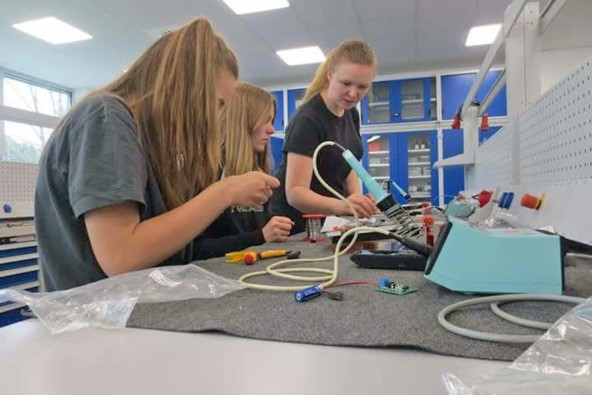
During the ‘Girls’Day’ 2018, Nadine introduces female students to technical and engineering professions at the soldering station.
At the technical college, only three of the 60 mechatronics engineers were female. ‘That ratio has changed a bit these days. At Liebherr-Werk Biberach GmbH (Germany), three of the 20 first-year mechatronics and electronics apprentices are female. But it would be great if we had even more female applicants. This profession is well suited to women, too .’
However, the early days were challenging for her as a young woman. ‘I didn’t know all the tools right away. There was the occasional smug remark. I quickly realised that I couldn’t be shy in a male-dominated field, and I learnt to be quick on my feet and to give as good as I got,’ she recalls. She had a great trainer at the time and, with his help, quickly got to grips with the tasks and topics at hand, the range of which was pretty vast. During her training at the Biberach site, she had placements at completely different stations in the workshops of Liebherr-Werk Biberach GmbH, Liebherr-Components Biberach GmbH and Liebherr-Electronics and Drives GmbH. ‘It was unbelievably varied – just the way I like it,’ says Nadine. As an apprentice, she was able to experience different product and working areas from every conceivable perspective – from large tower cranes to control cabinets. ‘I got to know a lot of people in the company, some of whom I’m still in touch with today.’
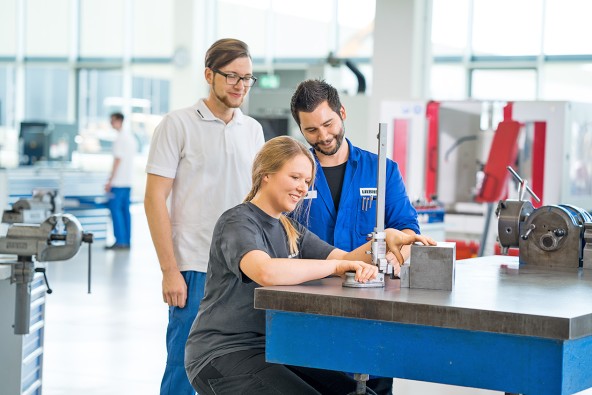
During Nadine’s apprenticeship in the metal sector at Liebherr-Werk Biberach GmbH (Deutschland) in 2015.
It was this overwhelmingly positive experience that led her to jump at a surprising opportunity that came her way once she completed her training at the extra-occupational master school. ‘I hadn’t even completed my master craftsman’s certificate when my boss asked me if I wanted to stand in at short notice for an instructor who was off work for an extended period. And I really wanted to.’
Even though she had already built some confidence after having presented the vocational pathway to becoming a mechatronics technician to pupils at the information day in her first year of training, and despite having had plenty of encouragement, Nadine felt that this significantly greater challenge was like jumping into the proverbial deep end. ‘Suddenly I had the weight of responsibility on my shoulders and was standing there in front of 40 apprentices with nothing in my hands but my own training documents. That was the first time I’d ever got really weak at the knees.’ Fortunately, she was still very familiar with the material from her own training. ‘My fears that I wouldn’t be well received by the apprentices were quickly dispelled. In fact, at the end of the lesson, someone said “I finally get it”. Clearly I’d managed to strike the right chord.’
The energy of the trainer is what brings training to life – and that energy is best and most directly conveyed face to face.
Sometimes Nadine is surprised by her own carefree attitude and the unshakeable optimism with which she goes through life, unafraid of any challenge. ‘I must have got this “hands-on” mentality from my father,’ she says. As a self-employed carpenter and joiner, he has always shown her how to get to grips with things, to think in terms of projects and bring them to a successful conclusion. With him as site manager and project manager, she has just built a wooden house for herself in her spare time. ‘We did almost 50 % of the work ourselves,’ she reports with pride. Thanks to all his experience as a craftsman and builder, her father had her back when it came to the big tasks. ‘It once again went to show just what can be achieved through teamwork.’
Despite everything she’s doing, she doesn’t think she will burn herself out. She still manages to relax and unwind enough to avoid that fate – for example, on long walks with her golden retriever, Paul. He even comes with her when she goes climbing, and then sits patiently and watches from below as Nadine makes her ascent.
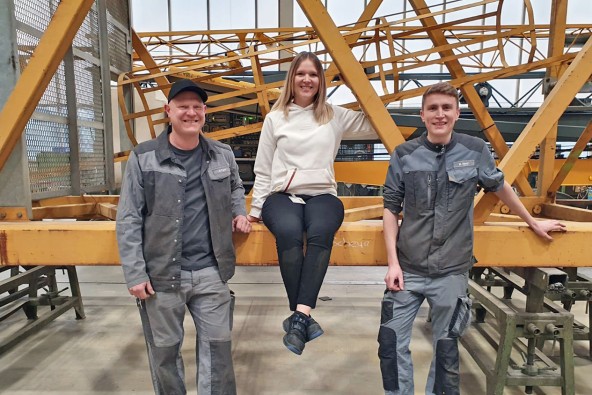
Training officers at Liebherr-Werk Biberach GmbH (Germany): Nadine Matzenmiller with her two colleagues from the repair department Benjamin Faust (left) and Martin Renz (right).
And Nadine has no doubt that things will continue to flourish for Liebherr in the long term: ‘The company is involved in some incredibly exciting fields of technology that have a bright future. Because of that, in these times of huge transformation, we need to constantly develop our training strategy so that it will still meet requirements in five or ten years’ time.’ Robotics and automation will ultimately continue to forge ahead, fuelled by artificial intelligence.
And that’s exactly the kind of challenge she enjoys. ‘I always want to stay on the ball, to sound out the latest trends and their possibilities,’ she says, setting a high bar for herself. ‘We don’t want to overburden our apprentices, but we also don’t want to be taken by surprise by developments,’ says the trainer. To achieve this, she also wants to make the most of digitalisation at Liebherr via online courses and blended learning. However, she soundly rejects the idea that training could one day be an entirely virtual affair, with no in-person meetings. ‘The energy of the trainer is what brings training to life – and that energy is best and most directly conveyed face to face.’ What she says must have some truth in it. ‘The very first apprentice that I trained myself recently joined our young team of trainers. I think that’s fantastic – and it makes me a little proud, too.’

